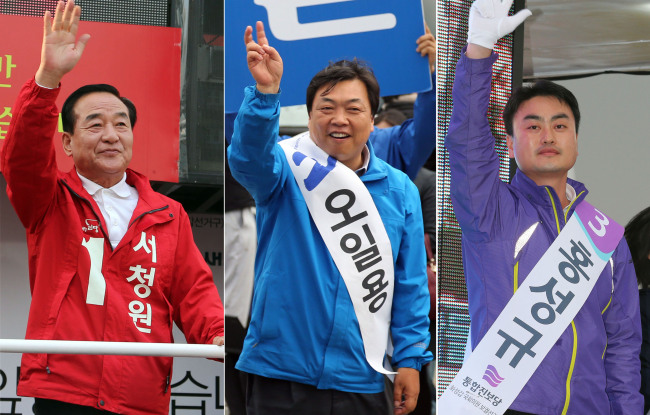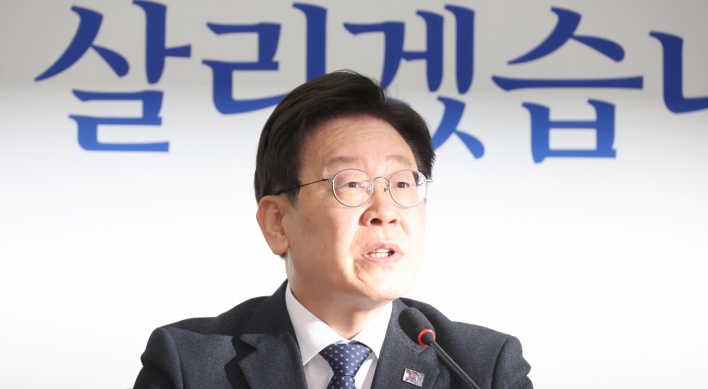By-elections expected to trigger power shift in ruling party
By 윤민식Published : Oct. 30, 2013 - 15:49

Voters in two regional districts went to the polls in bellwether by-elections Wednesday with initial results indicating victories by the ruling Saenuri Party candidates.
The elections came amid heightened political tension over national and military intelligence agents’ alleged meddling in last year’s presidential election.
In Gyeonggi Province’s Hwaseong-A district, veteran political Suh Chung-won is set to beat the Democratic Party’s Oh Il-yong to win his seventh term in the parliament.
In the Pohang Nam-gu-Ulleung-gun constituency, former minister of public administration Park Myung-jae was on course to take the region for the ruling party.
At 3 p.m., the voting rate stood at 24.8 percent. In comparison, the voting rate in April’s by-elections for National Assembly seats for the same time came in at 31.1 percent. Overall, the April by-elections saw 41.3 percent of the voters cast their ballots.
The Hwaseong-A constituency was left vacant following the death of Saenuri Party lawmaker Ko Hee-sun in August. The Pohang constituency had been vacant since July when Kim Hyung-tae, formerly of the ruling party, lost his seat after being found guilty of illegal campaigning.
Though only two seats at stake, the elections are seen as a key test of public sentiment toward the Park Geun-hye administration before next year’s local elections in June.
According to a survey announced last Friday, Park’s approval ratings fell to 53 percent from 56 percent the previous week, largely because of her failure to deliver on welfare pledges.
The attention is also focused on how Suh Chung-won’s return to parliament will affect the power balance in the ruling party.
Although high-level Saenuri Party officials have indicated otherwise, Suh is appears unlikely to settle for a parliamentary seat.
“(If elected into a) seventh term, I will unite the party so that the Saenuri Party can use all its capabilities to support the smooth operations of the Park Geun-hye administration,” Suh said on Tuesday, the last day of his campaign.
Suh is considered one of President Park Geun-hye’s closest allies who was central in forming the Pro-Park Geun-hye Alliance in 2008.
The pro-Park Geun-hye Alliance was a short-lived party that had splintered off from the Grand National Party. The group rejoined the GNP to form the Saenuri Party in early 2012, and its members went onto form the pro-Park faction that contended with the pro-Lee Myung-bak faction for dominance within the party.
In addition, returning for his seventh term, Suh also outmatches the two key pro-Park figures Reps. Kim Moo-sung and Choi Kyung-hwan in terms of seniority, a factor that carries significant weight in local politics. Choi, the current Saenuri Party floor leader, is in his third term and Kim is serving his fifth term.
Despite Suh’s connections and experience, however, the expansion of Suh’s influence is unlikely to be without resistance.
Rep. Kim Sung-tae and a number of first- and second-term Saenuri Party lawmakers met Suh’s nomination with public berating of the party’s leadership for breaking the promise of excluding individuals with records of sex crimes, bribery, and breaking regulations regarding political funding and primaries. Suh has been convicted of receiving illegal donations in 2002 and 2008.
While Suh’s return may herald a major power shift within the ruling party, some in the opposition bloc are hoping for the veteran politician to bring changes in the dynamics between the conservative and progressive blocs.
“(Suh) is someone who could open the way for communication between the ruling and opposition parties,” former DP floor leader Rep. Park Jie-won said in a radio interview earlier in the month, adding that Suh possessed leadership regardless of the questions regarding his ethicalities.
The prevailing opinion among opposition lawmakers, however, has been negative, casting doubt on possible improvements in bipartisan relations.
Following Suh’s nomination in early October, the DP issued an official statement saying that it was the “pinnacle of arrogance” that turned on “public sentiment and the principles the Saenuri Party drew up itself.”
By Choi He-suk (cheesuk@heraldcorp.com)




![[Herald Interview] 'Amid aging population, Korea to invite more young professionals from overseas'](http://res.heraldm.com/phpwas/restmb_idxmake.php?idx=644&simg=/content/image/2024/04/24/20240424050844_0.jpg&u=20240424200058)







![[Hello India] Hyundai Motor vows to boost 'clean mobility' in India](http://res.heraldm.com/phpwas/restmb_idxmake.php?idx=644&simg=/content/image/2024/04/25/20240425050672_0.jpg&u=)





![[Today’s K-pop] NewJeans' single teasers release amid intrigue](http://res.heraldm.com/phpwas/restmb_idxmake.php?idx=642&simg=/content/image/2024/04/26/20240426050575_0.jpg&u=)